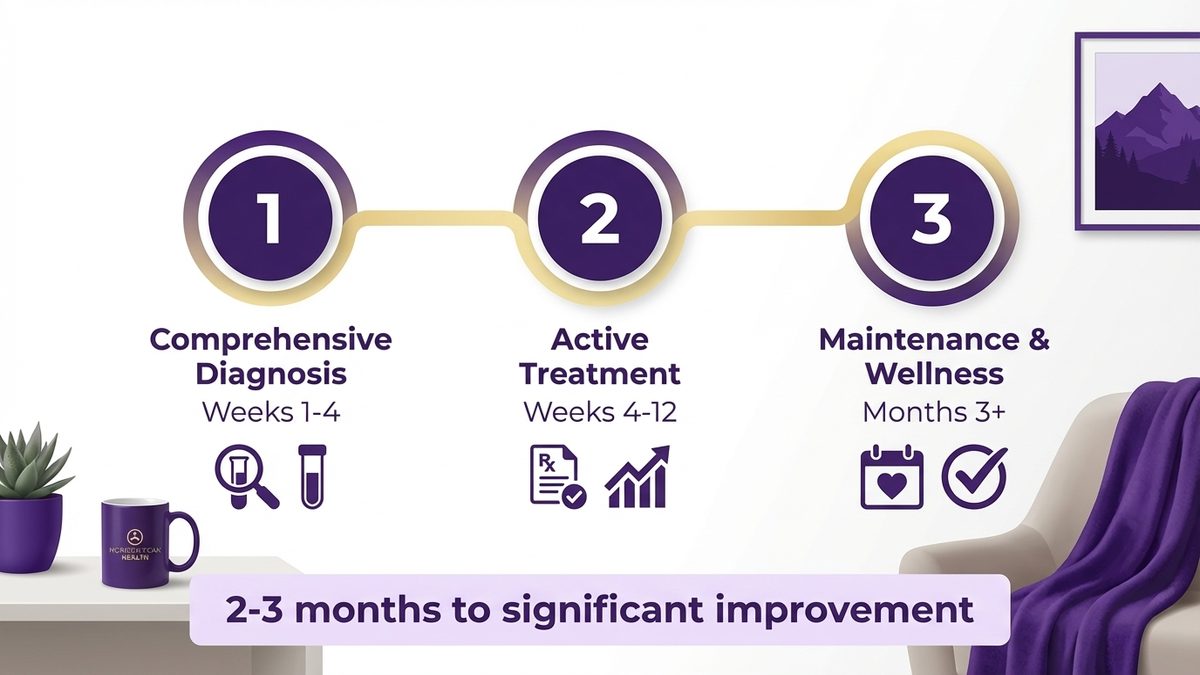DIAGNOSTIC PSYCHIATRY • LOS ANGELES & PHOENIX

Canybec Sulayman, PMHNP-BC
19 Years Critical Care Experience
Feel Like Yourself Again
Whether you're starting fresh or starting over, you deserve care that investigates first.
75-90 minute evaluations. Comprehensive lab panels — thyroid, ferritin, vitamin D, inflammatory markers, and more.
Treatment plans built on diagnostic findings, not trial-and-error prescribing.
Los Angeles Area
Palos Verdes Peninsula • Virtual & In-Person
Phoenix Area
Chandler • Virtual & In-Person
of psychiatric symptoms have undiagnosed medical causes
of patients achieve significant improvement
average time to significant improvement
typical wait for new patient appointments
Sound Familiar?
Is This You?
These situations often point to medical factors worth investigating. A diagnostic approach can change everything.
Your antidepressant isn't working as expected
Your labs came back "normal" but symptoms persist
You've wondered if something medical could explain your symptoms
Your ferritin, thyroid, or vitamin D was never checked
Standard psychiatry appointments feel rushed and incomplete
No one has explained the medical mechanism behind your symptoms
If any of these resonate, a diagnostic approach may be exactly what you need.
Schedule Your EvaluationWhat Is Diagnostic Psychiatry?
of complex psychiatric symptoms have underlying medical causes that standard psychiatric evaluation typically misses—thyroid dysfunction, nutritional deficiencies (B12, iron, vitamin D), undiagnosed sleep apnea, hormonal imbalances, chronic inflammation, medication interactions. When these go unidentified, patients cycle through multiple medications without improvement.
This is why I spend 75-90 minutes in initial evaluations, not 15 minutes. Why I order comprehensive medical workups. Why I look at the whole picture before recommending treatment.
What We Investigate
- • Complete review of medical history and current medications
- • Assessment for thyroid, metabolic, and hormonal factors
- • Evaluation of nutritional deficiencies (B12, iron, folate, vitamin D)
- • Sleep quality and potential sleep disorders
- • Medication interactions and side effects
- • Other systemic medical factors affecting mental health
Research shows that 40% of complex psychiatric symptoms have underlying medical causes that standard psychiatric evaluation typically misses. Diagnostic psychiatry applies ICU-level medical investigation to mental health—because your brain doesn't exist in isolation from your body.
Instead of immediately reaching for psychiatric medications, we investigate whether thyroid dysfunction, nutritional deficiencies, hormonal imbalances, sleep disorders, or medication interactions might be driving your symptoms.
Quick Facts
- New patients within 3-5 days
- 75-90 minute initial evaluation
- Virtual and in-person available
- Most major insurance accepted
- Licensed in California & Arizona
Common Focus Areas
- Depression & Mood Disorders
- Anxiety & Panic
- ADHD & Focus Issues
- Treatment-Resistant Symptoms
- Trauma & PTSD
- Sleep Disorders
- Cognitive Optimization
Office Locations
California
Palos Verdes Peninsula
Los Angeles area
Arizona
4025 W Chandler Blvd
Chandler, AZ 85226
Phone:
(310) 955-1041What We Investigate
8 Body Systems That Affect Mental Health
A comprehensive investigation examines how your entire body contributes to how you feel
Why this matters: Most psychiatric evaluations only examine symptoms. We examine the whole picture.
What To Expect
The Diagnostic Psychiatry Approach
ICU-level investigation applied to psychiatric care

Comprehensive Diagnosis
Weeks 1-4
Thorough evaluation including detailed history, targeted lab work, and investigation of potential medical causes.
- — 60-90 minute initial evaluation
- — Comprehensive lab panel
- — Review of all current medications
- — Sleep and lifestyle assessment
Active Treatment
Weeks 4-12
Address identified root causes with targeted interventions, whether medical treatment, nutritional optimization, or carefully chosen psychiatric medication.
- — Treat underlying medical conditions
- — Optimize nutritional deficiencies
- — Targeted medication if needed
- — Regular progress monitoring
Maintenance & Wellness
Months 3+
Once stable, transition to quarterly check-ins focused on maintaining your improvements and preventing relapse.
- — Quarterly wellness check-ins
- — Ongoing optimization
- — Preventive monitoring
- — Long-term stability
What Makes This Different
Traditional vs. Diagnostic Psychiatry
See how our approach differs from standard psychiatric care

Traditional Psychiatry
Initial Visit
15-30 minute symptom checklist
Diagnostic Method
Symptom-based diagnosis
Lab Work
Rarely ordered or basic panel
Treatment Approach
Trial-and-error medication
Timeline to Improvement
6-12+ months of medication trials
Diagnostic Psychiatry
Initial Visit
60-90 minute comprehensive evaluation
Diagnostic Method
Medical investigation + symptom analysis
Lab Work
Comprehensive targeted testing
Treatment Approach
Address root cause first
Timeline to Improvement
2-3 months with targeted treatment
Real Patient Outcomes
Real Patient Outcomes
See how diagnostic investigation has helped patients find answers

"After years of trying different antidepressants, my diagnostic workup revealed an underlying thyroid condition. Once treated, my depression lifted within weeks."
Time to Resolution
6 weeks

"I was told my anxiety was 'just stress.' The comprehensive evaluation found that my blood pressure medication was causing my symptoms. A simple medication change made all the difference."
Time to Resolution
3 weeks

"Ten years of treatment-resistant depression and brain fog. The diagnostic approach uncovered sleep apnea and iron deficiency. I finally feel like myself again."
Time to Resolution
10 weeks
Common Questions
Frequently Asked Questions
Will I need ongoing treatment after the diagnostic phase?
Many patients find their symptoms significantly improve or resolve once the underlying cause is identified and treated. Some may need brief medication support during treatment, which can often be tapered once the root cause is addressed.
Does insurance cover diagnostic psychiatry?
Yes, most major insurance plans cover our services. We accept Aetna, Blue Cross Blue Shield, Cigna, and United Healthcare. Our team can verify your benefits before your first appointment.
How quickly can I get an appointment?
Most new patients are seen within 3-5 business days. We understand that when you're struggling, waiting weeks or months isn't acceptable.
What conditions do you treat?
We specialize in investigating the root causes of depression, anxiety, ADHD, brain fog, fatigue, insomnia, and treatment-resistant psychiatric conditions. Our approach is particularly valuable for patients who haven't responded to standard treatments.
What should I expect at my first appointment?
Your initial evaluation is a comprehensive 60-90 minute session. We'll review your complete medical history, discuss your symptoms in detail, and often order targeted lab work. This isn't a 15-minute medication check—it's a thorough investigation.
Insurance Accepted
We Accept Insurance
Making quality psychiatric care accessible








+ many more · Not sure if we accept yours? Contact us to verify
For Referring Physicians
For Referring Physicians
Partner with us to help your patients get answers
Why Specialists Refer
- Comprehensive Reports: Detailed diagnostic findings and treatment recommendations sent directly to you
- Collaborative Care: We work alongside your care plan, not against it
- Quick Communication: Direct access to discuss complex cases
- Timely Appointments: Priority scheduling for referred patients
Referral Information
Contact us for specialist referral process, expected timeline, and coordination approach.
See If This Is Right For YouOr email: referrals@horizonpeakhealth.com
Getting Started
What Happens After You Book
Your path to answers starts here
Book Online
Choose a convenient time through our secure booking system
2 minutesComplete Intake Forms
Fill out your comprehensive health history before your appointment
15-20 minutesInitial Evaluation
Meet with your provider for a thorough diagnostic assessment
60-90 minutesLab Work
Complete targeted testing to investigate potential causes
Same weekResults & Treatment Plan
Review findings and create your personalized treatment plan
1-2 weeksBook Online
Choose a convenient time through our secure booking system
2 minutesComplete Intake Forms
Fill out your comprehensive health history before your appointment
15-20 minutesInitial Evaluation
Meet with your provider for a thorough diagnostic assessment
60-90 minutesLab Work
Complete targeted testing to investigate potential causes
Same weekResults & Treatment Plan
Review findings and create your personalized treatment plan
1-2 weeksMost patients see significant improvement within 2-3 months

Contact Us
Get in Touch
Have questions? We're here to help. Send us a message or schedule your evaluation today.
Ready to Find Out Why?
Stop guessing. Start investigating. Schedule your comprehensive evaluation today.
Schedule Your EvaluationPatient Experiences
What Our Patients Say
Perfect rating on Google
"I cannot say enough positive things about Canybec Sulayman at Horizon Peak Health. His level of medical knowledge and clinical expertise is exceptional, and the care he provides has been truly life-changing for me. I have very complex needs and he has been thorough and attentive throughout my treatment."
Lindsay C.
a week ago
"Canybec is the best NP I've been to. He really listens and gives thorough care."
Lauren A.
a week ago
"This provider has a great reputation and reported experience with patients we have referred to him! Highly recommended!"
Lisa T.
a month ago
"The best experience I have had with an NP. He has so much knowledge and his bedside manner shows he truly cares."
Kane E.
a month ago
"Good help is hard to find. And I'm incredibly grateful that I found Canybec because he's one of the best. He instills in you a curiosity about treatment so that you yourself can get a really good sense of what meds and dose are right for you. It's as engaged as I've seen any clinician. He has reached out to me outside of sessions, giving me ideas on other things that can help. I appreciate the holistic approach that he takes. Lastly, it's incredibly clear that he actually cares. If life circumstances get hard and things aren't working for you, Canybec will work with you. He tries to find creative ways to make things as cost-effective for you as possible. Can't thank him enough for all his help."
John
3 weeks ago
"I usually don't leave any reviews positive or negative. But after meeting Canybec, you feel he actually cares about his patients. He always listens to you and doesn't make you feel like he's in a hurry and wants to get to the bottom of your problems. It's like it's his mission to help you resolve all your health issues. So I felt compelled to write this review and show my appreciation. I highly recommend him to anyone that needs help, you won't be disappointed."
Francisco Y.
a week ago
"If you've struggled to find a quality provider, look no further. Canybec is easy to talk to, never feels clinical or scripted, and genuinely cares. He creates a safe, supportive space that's helped me grow and heal over the past year. He's also super up-to-date with the latest in mental health, so I feel like I'm learning something new every time we meet. Highly recommend!"
Nidia G.
4 months ago
"Just wanted to thank Canybec for help in managing my mental health needs. After an unpleasant experience with my PCP who initially managed my mental health needs, I reached out to Canybec who was very knowledgeable, patient, and empathetic. I informed him of the side effects I was having on a certain class of medications. He explored and offered different medication and treatment options - even showing latest evidence-based practice and research for each option. Thankfully, the option I've chosen has been working great for me without the major side effects and allowed me to be functional again."
Katie C.
2 months ago
"Canybec is very knowledgeable and resourceful, he actually knows what he's talking about. He makes you feel comfortable talking about your issues and helps you through them without any judgement."
Laureen C.
2 months ago
"Horizon Peak Health set a new bar for mental health care. From intake to follow-up, everything was clear, respectful, and on time. Canybec actually listened, explained options, and gave me a step-by-step plan I could follow."
Lauren A.
3 months ago
"As a healthcare professional, it is so refreshing to see a holistic approach in dealing with my ADHD. I was newly diagnosed as an adult and Horizon Peak Health has made this transition so comfortable for me. NP Canybec offers a safe space with his clinical expertise, holistic thinking, and real-world empathy. Highly, highly recommend!"
Chloe A.
4 months ago
"Canybec is excellent! He really listens and cares about what is going on. I appreciate his attentiveness and willingness to think outside the box!"
Kaela H.
2 months ago
"I drove in from Santa Clarita after coworkers kept talking up Horizon Peak Health in Rancho Palos Verdes. Six months later I'm a belt notch slimmer, skin looks brighter, and my mind feels clearer. So many compliments on my skin! Their integrative approach really works."
Susan L.
5 months ago
"I like that Canybec NP takes integrative psychiatry and assesses both psychiatry and metabolic health. Another plus is that he collaborates with the Baron clinic so if there are labs that need to be drawn etc they can do that in the same location."
Christina
11 months ago
"Ask for Canybec NP for a thorough review of your metabolic health. I was impressed with how much time he spent getting to know me as a patient. He is very passionate and very knowledgeable about helping me meet my goals."
Kenya R.
11 months ago
"What I love most is that they are upfront about everything - costs, treatment plans, medication options. No guessing game. Plus they were able to get me within a week of calling, just in time to get my new refill. Thank you!"
Abigail K.
11 months ago
"I cannot say enough positive things about Canybec Sulayman at Horizon Peak Health. His level of medical knowledge and clinical expertise is exceptional, and the care he provides has been truly life-changing for me. I have very complex needs and he has been thorough and attentive throughout my treatment."
Lindsay C.
a week ago
"Canybec is the best NP I've been to. He really listens and gives thorough care."
Lauren A.
a week ago
"This provider has a great reputation and reported experience with patients we have referred to him! Highly recommended!"
Lisa T.
a month ago
"The best experience I have had with an NP. He has so much knowledge and his bedside manner shows he truly cares."
Kane E.
a month ago
"Good help is hard to find. And I'm incredibly grateful that I found Canybec because he's one of the best. He instills in you a curiosity about treatment so that you yourself can get a really good sense of what meds and dose are right for you. It's as engaged as I've seen any clinician. He has reached out to me outside of sessions, giving me ideas on other things that can help. I appreciate the holistic approach that he takes. Lastly, it's incredibly clear that he actually cares. If life circumstances get hard and things aren't working for you, Canybec will work with you. He tries to find creative ways to make things as cost-effective for you as possible. Can't thank him enough for all his help."
John
3 weeks ago
"I usually don't leave any reviews positive or negative. But after meeting Canybec, you feel he actually cares about his patients. He always listens to you and doesn't make you feel like he's in a hurry and wants to get to the bottom of your problems. It's like it's his mission to help you resolve all your health issues. So I felt compelled to write this review and show my appreciation. I highly recommend him to anyone that needs help, you won't be disappointed."
Francisco Y.
a week ago
"If you've struggled to find a quality provider, look no further. Canybec is easy to talk to, never feels clinical or scripted, and genuinely cares. He creates a safe, supportive space that's helped me grow and heal over the past year. He's also super up-to-date with the latest in mental health, so I feel like I'm learning something new every time we meet. Highly recommend!"
Nidia G.
4 months ago
"Just wanted to thank Canybec for help in managing my mental health needs. After an unpleasant experience with my PCP who initially managed my mental health needs, I reached out to Canybec who was very knowledgeable, patient, and empathetic. I informed him of the side effects I was having on a certain class of medications. He explored and offered different medication and treatment options - even showing latest evidence-based practice and research for each option. Thankfully, the option I've chosen has been working great for me without the major side effects and allowed me to be functional again."
Katie C.
2 months ago
"Canybec is very knowledgeable and resourceful, he actually knows what he's talking about. He makes you feel comfortable talking about your issues and helps you through them without any judgement."
Laureen C.
2 months ago
"Horizon Peak Health set a new bar for mental health care. From intake to follow-up, everything was clear, respectful, and on time. Canybec actually listened, explained options, and gave me a step-by-step plan I could follow."
Lauren A.
3 months ago
"As a healthcare professional, it is so refreshing to see a holistic approach in dealing with my ADHD. I was newly diagnosed as an adult and Horizon Peak Health has made this transition so comfortable for me. NP Canybec offers a safe space with his clinical expertise, holistic thinking, and real-world empathy. Highly, highly recommend!"
Chloe A.
4 months ago
"Canybec is excellent! He really listens and cares about what is going on. I appreciate his attentiveness and willingness to think outside the box!"
Kaela H.
2 months ago
"I drove in from Santa Clarita after coworkers kept talking up Horizon Peak Health in Rancho Palos Verdes. Six months later I'm a belt notch slimmer, skin looks brighter, and my mind feels clearer. So many compliments on my skin! Their integrative approach really works."
Susan L.
5 months ago
"I like that Canybec NP takes integrative psychiatry and assesses both psychiatry and metabolic health. Another plus is that he collaborates with the Baron clinic so if there are labs that need to be drawn etc they can do that in the same location."
Christina
11 months ago
"Ask for Canybec NP for a thorough review of your metabolic health. I was impressed with how much time he spent getting to know me as a patient. He is very passionate and very knowledgeable about helping me meet my goals."
Kenya R.
11 months ago
"What I love most is that they are upfront about everything - costs, treatment plans, medication options. No guessing game. Plus they were able to get me within a week of calling, just in time to get my new refill. Thank you!"
Abigail K.
11 months ago
"What I love most is that they are upfront about everything - costs, treatment plans, medication options. No guessing game. Plus they were able to get me within a week of calling, just in time to get my new refill. Thank you!"
Abigail K.
11 months ago
"Ask for Canybec NP for a thorough review of your metabolic health. I was impressed with how much time he spent getting to know me as a patient. He is very passionate and very knowledgeable about helping me meet my goals."
Kenya R.
11 months ago
"I like that Canybec NP takes integrative psychiatry and assesses both psychiatry and metabolic health. Another plus is that he collaborates with the Baron clinic so if there are labs that need to be drawn etc they can do that in the same location."
Christina
11 months ago
"I drove in from Santa Clarita after coworkers kept talking up Horizon Peak Health in Rancho Palos Verdes. Six months later I'm a belt notch slimmer, skin looks brighter, and my mind feels clearer. So many compliments on my skin! Their integrative approach really works."
Susan L.
5 months ago
"Canybec is excellent! He really listens and cares about what is going on. I appreciate his attentiveness and willingness to think outside the box!"
Kaela H.
2 months ago
"As a healthcare professional, it is so refreshing to see a holistic approach in dealing with my ADHD. I was newly diagnosed as an adult and Horizon Peak Health has made this transition so comfortable for me. NP Canybec offers a safe space with his clinical expertise, holistic thinking, and real-world empathy. Highly, highly recommend!"
Chloe A.
4 months ago
"Horizon Peak Health set a new bar for mental health care. From intake to follow-up, everything was clear, respectful, and on time. Canybec actually listened, explained options, and gave me a step-by-step plan I could follow."
Lauren A.
3 months ago
"Canybec is very knowledgeable and resourceful, he actually knows what he's talking about. He makes you feel comfortable talking about your issues and helps you through them without any judgement."
Laureen C.
2 months ago
"Just wanted to thank Canybec for help in managing my mental health needs. After an unpleasant experience with my PCP who initially managed my mental health needs, I reached out to Canybec who was very knowledgeable, patient, and empathetic. I informed him of the side effects I was having on a certain class of medications. He explored and offered different medication and treatment options - even showing latest evidence-based practice and research for each option. Thankfully, the option I've chosen has been working great for me without the major side effects and allowed me to be functional again."
Katie C.
2 months ago
"If you've struggled to find a quality provider, look no further. Canybec is easy to talk to, never feels clinical or scripted, and genuinely cares. He creates a safe, supportive space that's helped me grow and heal over the past year. He's also super up-to-date with the latest in mental health, so I feel like I'm learning something new every time we meet. Highly recommend!"
Nidia G.
4 months ago
"I usually don't leave any reviews positive or negative. But after meeting Canybec, you feel he actually cares about his patients. He always listens to you and doesn't make you feel like he's in a hurry and wants to get to the bottom of your problems. It's like it's his mission to help you resolve all your health issues. So I felt compelled to write this review and show my appreciation. I highly recommend him to anyone that needs help, you won't be disappointed."
Francisco Y.
a week ago
"Good help is hard to find. And I'm incredibly grateful that I found Canybec because he's one of the best. He instills in you a curiosity about treatment so that you yourself can get a really good sense of what meds and dose are right for you. It's as engaged as I've seen any clinician. He has reached out to me outside of sessions, giving me ideas on other things that can help. I appreciate the holistic approach that he takes. Lastly, it's incredibly clear that he actually cares. If life circumstances get hard and things aren't working for you, Canybec will work with you. He tries to find creative ways to make things as cost-effective for you as possible. Can't thank him enough for all his help."
John
3 weeks ago
"The best experience I have had with an NP. He has so much knowledge and his bedside manner shows he truly cares."
Kane E.
a month ago
"This provider has a great reputation and reported experience with patients we have referred to him! Highly recommended!"
Lisa T.
a month ago
"Canybec is the best NP I've been to. He really listens and gives thorough care."
Lauren A.
a week ago
"I cannot say enough positive things about Canybec Sulayman at Horizon Peak Health. His level of medical knowledge and clinical expertise is exceptional, and the care he provides has been truly life-changing for me. I have very complex needs and he has been thorough and attentive throughout my treatment."
Lindsay C.
a week ago
"What I love most is that they are upfront about everything - costs, treatment plans, medication options. No guessing game. Plus they were able to get me within a week of calling, just in time to get my new refill. Thank you!"
Abigail K.
11 months ago
"Ask for Canybec NP for a thorough review of your metabolic health. I was impressed with how much time he spent getting to know me as a patient. He is very passionate and very knowledgeable about helping me meet my goals."
Kenya R.
11 months ago
"I like that Canybec NP takes integrative psychiatry and assesses both psychiatry and metabolic health. Another plus is that he collaborates with the Baron clinic so if there are labs that need to be drawn etc they can do that in the same location."
Christina
11 months ago
"I drove in from Santa Clarita after coworkers kept talking up Horizon Peak Health in Rancho Palos Verdes. Six months later I'm a belt notch slimmer, skin looks brighter, and my mind feels clearer. So many compliments on my skin! Their integrative approach really works."
Susan L.
5 months ago
"Canybec is excellent! He really listens and cares about what is going on. I appreciate his attentiveness and willingness to think outside the box!"
Kaela H.
2 months ago
"As a healthcare professional, it is so refreshing to see a holistic approach in dealing with my ADHD. I was newly diagnosed as an adult and Horizon Peak Health has made this transition so comfortable for me. NP Canybec offers a safe space with his clinical expertise, holistic thinking, and real-world empathy. Highly, highly recommend!"
Chloe A.
4 months ago
"Horizon Peak Health set a new bar for mental health care. From intake to follow-up, everything was clear, respectful, and on time. Canybec actually listened, explained options, and gave me a step-by-step plan I could follow."
Lauren A.
3 months ago
"Canybec is very knowledgeable and resourceful, he actually knows what he's talking about. He makes you feel comfortable talking about your issues and helps you through them without any judgement."
Laureen C.
2 months ago
"Just wanted to thank Canybec for help in managing my mental health needs. After an unpleasant experience with my PCP who initially managed my mental health needs, I reached out to Canybec who was very knowledgeable, patient, and empathetic. I informed him of the side effects I was having on a certain class of medications. He explored and offered different medication and treatment options - even showing latest evidence-based practice and research for each option. Thankfully, the option I've chosen has been working great for me without the major side effects and allowed me to be functional again."
Katie C.
2 months ago
"If you've struggled to find a quality provider, look no further. Canybec is easy to talk to, never feels clinical or scripted, and genuinely cares. He creates a safe, supportive space that's helped me grow and heal over the past year. He's also super up-to-date with the latest in mental health, so I feel like I'm learning something new every time we meet. Highly recommend!"
Nidia G.
4 months ago
"I usually don't leave any reviews positive or negative. But after meeting Canybec, you feel he actually cares about his patients. He always listens to you and doesn't make you feel like he's in a hurry and wants to get to the bottom of your problems. It's like it's his mission to help you resolve all your health issues. So I felt compelled to write this review and show my appreciation. I highly recommend him to anyone that needs help, you won't be disappointed."
Francisco Y.
a week ago
"Good help is hard to find. And I'm incredibly grateful that I found Canybec because he's one of the best. He instills in you a curiosity about treatment so that you yourself can get a really good sense of what meds and dose are right for you. It's as engaged as I've seen any clinician. He has reached out to me outside of sessions, giving me ideas on other things that can help. I appreciate the holistic approach that he takes. Lastly, it's incredibly clear that he actually cares. If life circumstances get hard and things aren't working for you, Canybec will work with you. He tries to find creative ways to make things as cost-effective for you as possible. Can't thank him enough for all his help."
John
3 weeks ago
"The best experience I have had with an NP. He has so much knowledge and his bedside manner shows he truly cares."
Kane E.
a month ago
"This provider has a great reputation and reported experience with patients we have referred to him! Highly recommended!"
Lisa T.
a month ago
"Canybec is the best NP I've been to. He really listens and gives thorough care."
Lauren A.
a week ago
"I cannot say enough positive things about Canybec Sulayman at Horizon Peak Health. His level of medical knowledge and clinical expertise is exceptional, and the care he provides has been truly life-changing for me. I have very complex needs and he has been thorough and attentive throughout my treatment."
Lindsay C.
a week ago